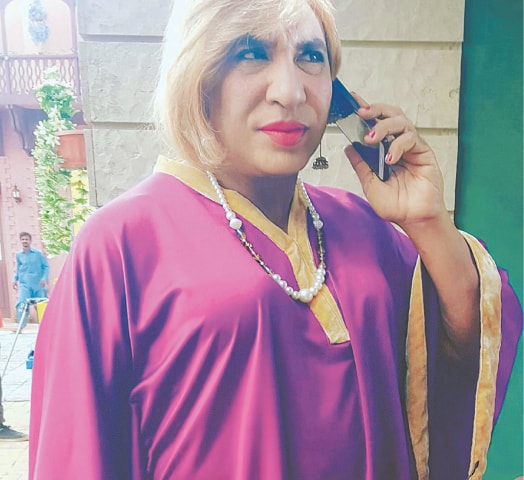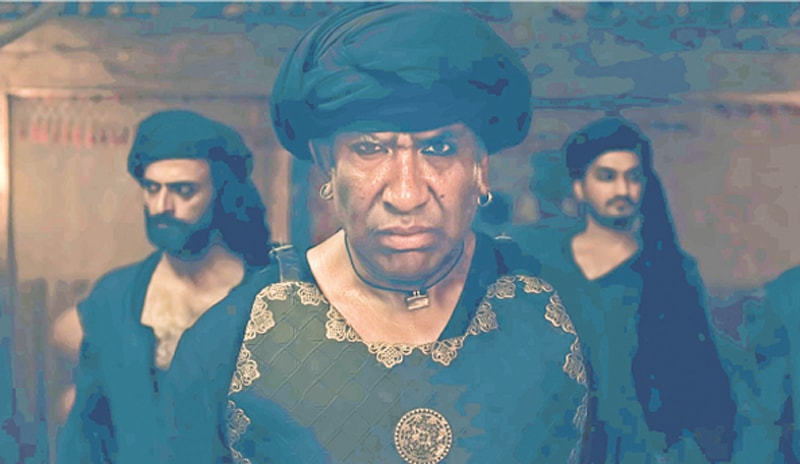
A guttural, heavy cackle comes out of Nayyar Ejaz when I ask him if he’s ever compared to the late, great Amresh Puri.
“It’s a compliment I’ve gotten many, many times. I think of it as an achievement,” he tells me. “The villains he played often dominated films, but even the positive characters he played weren’t second-fiddle either.”
Like Puri, Ejaz tells me he too has played some positive characters that were popular, such as his character from the PTV play Bhanwar. But that was a long time ago, in an entertainment world leagues different from today’s.
One thing remains unchanged in these many years, however: Ejaz’s commitment to bringing something new to his characters. “At times, I’m over-committed to my roles,” he explains.
He calls his process of discovering his characters “interpretation.” It’s a simple word that may create havoc on most sets, I imagine — a director may have his interpretation of a character, which may be different from an actor’s, or even the screenwriter’s — but then again, I don’t imagine Ejaz to be a part of any film where he’s the cause of such havoc.
Character actor par excellence, Nayyar Ejaz still has a lot to give to the entertainment industry, but it’s an industry that remains somewhat oblivious to his immense potential as a versatile performer
Despite playing different shades of baddies in movies — he’s played an evil Arab Sheikh in Na Maloom Afraad 2, an evil politician in The System, a mean, anti-feminist lawyer in Actor in Law, a terrorist preacher in Saya-i-Khuda-i-Zuljalal, an evil transgender don in Mehrunisa V Lub U, the big, bad boss in Teefa in Trouble, and a surreptitious talent manager-cum-journalist in Baaji, amongst other bad guy roles — Ejaz is really a nice guy in person.
Once upon a time, a long time ago (probably three years ago), I was previewing a cut of Zarrar with Shaan Shahid, which stars Ejaz as a lynchpin of the film. He plays a character that is — without giving anything away — a trigger for chaos in the latter part of the film.

Seeing Ejaz on screen, I asked Shaan why he chose to cast Ejaz in a role one might expect from him. Shaan told me that at times one should adhere to audiences’ expectations. The right casting — even if it looks stereotypical — is necessary to build-off a character from; and it’s not like the character is of the same mould Ejaz is used to playing of late.
The words came back to me a few months ago while visiting the sets of Ghabrana Nahin Hai. In a big room cramped by a large bed, chairs, actors’ wardrobes and whatnot, sat Ejaz on a sofa.
This was my first meeting with Ejaz. We didn’t speak for a good while, even though we sat next to each other. As actors go, I could sense he had his character down pat.
Again, it would be premature to discuss what the character is about — but I guess it’s safe to say that, even though he may appear to be a villain, he might not be what people expect.
Today, as Ejaz is interviewed for Icon on the phone (he’s in Lahore, spending Ramazan in prayers), I ask him if he’s tired of playing villains — and why he’s sought after as the go-to bad guy.
Ejaz laughs one of his guttural, heavy laughs and tells me that he doesn’t mind. Probably because the money’s good, possibly because he gets to imagine avatars in roles that push his creative limits but, realistically, because that’s what the industry wants from him right now.

“That’s not to say that I’m playing villains all the time,” he says. “The five films I’m a part of right now — The Legend of Maula Jatt, Zarrar, Quaid-i-Azam Zindabad, Ghabrana Nahin Hai and Ishrat Made in China — all feature vastly different takes on stereotypical roles, be it villains or comedy.”
I ask Ejaz if there is a comedy role in this line-up somewhere, but he is cryptic. “Some have shades of comedy, others have something unexpected.”
Ejaz worked a lot for PTV Quetta, he tells me. “Dhuwaan, Dasht — in Dasht I played a stammering youngster who witnessed his parents’ murders. I did that performance years before Shah Rukh Khan in Darr.”
Ejaz, a brother of 11 siblings, didn’t even know that he would become an actor when he was young. “I was playing cricket in Lahore — I even played a few first-class matches,” he begins. “My father, who was stationed in Quetta, fell ill and I went there. One day, a friend of my brother’s — a director at PTV by the name of Qambar Ali Shah — was taken aback when he heard my voice upon seeing me at a shop. He offered me a role, even when I told him that I didn’t know acting. The director told me to just mimic what he was doing, and I did that.
“The year was 1984 or ’85, and the show was called Zindagi Jis Ke Naam — it was Asghar Nadeem Syed’s first play,” he adds.
Ejaz worked a lot for PTV Quetta, he tells me. “Dhuwaan, Dasht — in Dasht I played a stammering youngster who witnessed his parents’ murders. I did that performance years before Shah Rukh Khan in Darr.”
Eventually, Ejaz travelled to Lahore to do a film called Shartiya Mithay — which was a hit, he adds — and ended up signing no less than 15 films on the first day of his shoot. “There was no looking back from there on, by the grace of God,” he says.
Ejaz, who lives a calm life with his wife — his partner and friend — has come a long way to get here, he tells me. The couple lost a child years ago, and so it’s just the two of them now, he says — his voice sounding a little shaken with the memory.

When I ask him about his most memorable roles, he goes into a list of yesteryear PTV serials: Dasht, Dhuwaan, Laag, Janjaal Pura, Aan. So, his recent works don’t measure up, I ask him? “I don’t take projects that don’t excite me — or don’t give me much to do.”
The actor has become selective of the work he undertakes these days, he explains. “I don’t do much, but what I do has to count for something.” His reason for being selective was borne out of necessity, I gather. He was getting the same roles over and over again, which, I assume, took a big jab at his credibility.
“It’s a give-and-take process,” he had told me once — and he was giving his roles too much. “I enjoy making up characters,” he says. “Even characters that may seem similar have something different to them.
“An actor has to gauge his level of performance. I can’t speak for anyone else, but every actor has to measure and perform according to the character’s scope and level. At times, I give it my all, but other performances — or sometimes how the film is put together in the edit — dictates how well my character turns out,” he explains.
“We’re not able to realise the potential of actors in Pakistan. Yahaan gadha, ghorra aik hi haank raha hota hai [In the Pakistani film industry, there’s no distinction between a horse and a donkey],” he says, adding a yell “Haraa!” — the cry a donkey-owner makes when forcing the animal to move — for good measure.
“Oftentimes, producers spend months trying to negotiate prices of an actor, when they could use the same time to craft characters,” he exclaims.
There are directors who get him, he says. Nabeel Qureshi gives him space to flesh out particular aspects of his characters. “It’s not that most directors don’t, but with Nabeel, I know beforehand the character will turn out to be spectacular.

“Saqib Malik and I sat down to craft my character for hours one day,” he says, jumping on to another story. “My character, Chand Kamal, in Baaji was a mix — this character is a so-called journalist, an actor’s manager, a star-maker with the cunningness to bring stars down. He has a tacky and corny sense of style. He sports a wig and wears matching maroon pants and shirts. To him, his angle — his take — of the situation, is right. Chand Kamal feels that what he’s doing is right.
“When the film went to Canada’s Mosaic Film Festival, the performance won me the Best Supporting Actor award. To think that I didn’t win that over here. Here, we don’t appreciate our actors, but our work does get recognised abroad,” he laughs. Over the phone, I can’t make out if he’s being sarcastic or just disappointed.
“The same people who nominate and then give out awards, call me up to congratulate me on my performance,” he adds.
As one of the most talented, versatile actors in film and television, Ejaz still pines for that one role that would push his limits as an actor. Citing Marlon Brando and Robert DeNiro, he says actors who have seen their calibre of performance pine for roles that break the mould. Still, he’s grateful for what he has, he says. Like Amresh Puri, everyone sees the immense potential of this actor.
“One has to keep fighting. To strive for greater things. The industry will come around sooner or later.”
I hope it’s soon, because Nayyar Ejaz still has a lot to give to the industry yet.
Published in Dawn, ICON, May 9th, 2021















































Dear visitor, the comments section is undergoing an overhaul and will return soon.